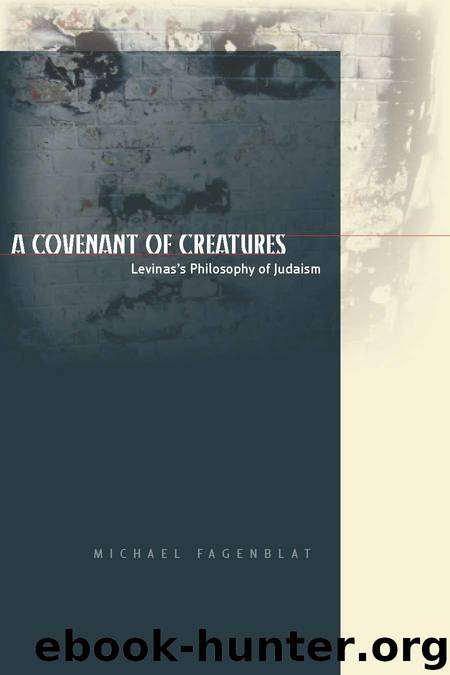A Covenant of Creatures by Fagenblat Michael

Author:Fagenblat, Michael
Language: eng
Format: epub
Publisher: Stanford University Press
Published: 2011-07-28T16:00:00+00:00
If YHWH designates the God without being, beyond predication and negation, to which Moses acceded when the Name was given to him, glory declaims, through bones and minerals, that to which YHWH also refers. If the via negativa leads from metaphysics to the Name, glory indicates the via eminentia of another way. Glory refers, “sometimes,” to the essence and true reality of YHWH. Every subsequent attempt to speak properly of God is therefore cleaved by the choice between the looseness of a theological language whose legitimacy is entirely dependent on its causal-historical relation to the unique Name (the way of Maimonidean orthodoxy) and the language of glory spoken “by means of articulate utterance or without it,” by humans who apprehend and communicate it or by those who “have no apprehension, as for instance the minerals,” and, indeed, “the whole earth” (the way of Maimonidean heterodoxy). For example, when the minerals praise YHWH by “saying” themselves gloriously, they do not use the proper Name. But neither do they simply indicate a metaphorical and metaphysical account of God’s power and wisdom, for glory is not a metaphor but the “essence and true reality” of God. Glory is not a derivative name referring back to YHWH but constitutes the original impropriety of the proper Name. Glory disperses the true reality of God, beyond being and negation, encapsulated by the Name. No less than the Name, glory exceeds the descriptive and conceptual resources of ordinary language and experience because it bears the true reality of God, without metaphor or metaphysics. Like the Name, glory indicates the truth of God beyond the limits of both intellect and imagination. Neither the Name nor the glory is the object of perception or intellection, but for opposite reasons. Whereas the Name designates the true reality of God because it empties the idea of “God” of all semantic content, glory indicates it with an abundance of sense that neither reason nor the imagination can contain: a “perpetual, dazzling light the overflow of which illumines all that is dark—in accordance with what is said in the prophetic parables: And the earth did shine with His glory [Ezek. 43:2]” (Guide III.9, 437). If the Name accedes to the non-metaphoricity and non-metaphysicality of God because it successfully refers while being perfectly empty of meaning, glory accedes to the Real in the mode of superabundance. The name is sense emptied of significance, whereas glory is the excess of sense over significance.48 Neither the Name nor the glory belongs to the order of cognition or of perception. To encounter the Name is to belong to the order of tradition, that is, to the causal-historical chain relating back to the initial baptism, and to encounter the glory is to forgo the categories of consciousness by yielding to its blinding and bedazzling phenomenality. As Marion puts it, “The gaze cannot any longer sustain a light that bedazzles and burns.... Thus the glory of the visible weighs down with all it has.”49 Spinoza also identified this surplus
Download
This site does not store any files on its server. We only index and link to content provided by other sites. Please contact the content providers to delete copyright contents if any and email us, we'll remove relevant links or contents immediately.
| Deconstruction | Existentialism |
| Humanism | Phenomenology |
| Pragmatism | Rationalism |
| Structuralism | Transcendentalism |
| Utilitarianism |
The remains of the day by Kazuo Ishiguro(8981)
Tools of Titans by Timothy Ferriss(8369)
Giovanni's Room by James Baldwin(7330)
The Black Swan by Nassim Nicholas Taleb(7111)
Inner Engineering: A Yogi's Guide to Joy by Sadhguru(6785)
The Way of Zen by Alan W. Watts(6601)
Asking the Right Questions: A Guide to Critical Thinking by M. Neil Browne & Stuart M. Keeley(5762)
The Power of Now: A Guide to Spiritual Enlightenment by Eckhart Tolle(5760)
The Six Wives Of Henry VIII (WOMEN IN HISTORY) by Fraser Antonia(5505)
Astrophysics for People in a Hurry by Neil DeGrasse Tyson(5182)
Housekeeping by Marilynne Robinson(4436)
12 Rules for Life by Jordan B. Peterson(4299)
Double Down (Diary of a Wimpy Kid Book 11) by Jeff Kinney(4261)
Ikigai by Héctor García & Francesc Miralles(4247)
The Ethical Slut by Janet W. Hardy(4243)
Skin in the Game by Nassim Nicholas Taleb(4240)
The Art of Happiness by The Dalai Lama(4125)
Skin in the Game: Hidden Asymmetries in Daily Life by Nassim Nicholas Taleb(3993)
Walking by Henry David Thoreau(3953)
